Hilton Worldwide Holdings Bundle
How Does Hilton Dominate the Global Hospitality Market?
Hilton Worldwide Holdings, a titan in the global hospitality industry, has consistently demonstrated exceptional sales and marketing strategies. From its humble beginnings in 1919, Hilton has transformed into a global powerhouse with over 7,600 properties worldwide. This success story is a testament to its innovative approach to customer engagement and brand building.
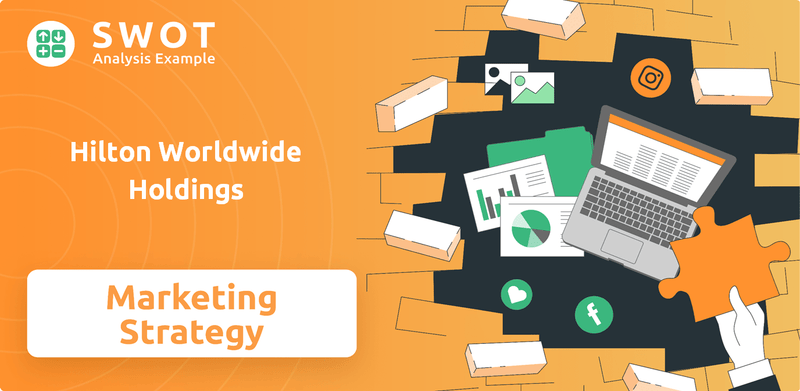
This analysis dives deep into the Hilton Worldwide Holdings SWOT Analysis, exploring how Hilton leverages its diverse brand portfolio and digital infrastructure to reach its target audience effectively. We'll unpack Hilton's sales strategy, examining its customer relationship management (CRM) and revenue management Hilton tactics. Furthermore, we'll explore Hilton's marketing strategy, including its social media marketing campaigns, content marketing examples, and global marketing initiatives, to understand how it maintains its competitive edge in the dynamic hospitality landscape and increases hotel bookings.
How Does Hilton Worldwide Holdings Reach Its Customers?
The sales strategy of Hilton Worldwide Holdings is a multifaceted approach, utilizing a blend of online and offline channels to maximize reach and bookings. This Revenue Streams & Business Model of Hilton Worldwide Holdings employs a strategic mix of direct and indirect channels to capture a wide audience. The company's success relies on its ability to adapt to the evolving preferences of consumers and leverage technology to enhance the booking experience.
Hilton's primary sales channels include its proprietary e-commerce platforms, notably Hilton.com and the Hilton Honors app. These direct channels are crucial for driving revenue, offering guests the most favorable terms and loyalty program benefits. Furthermore, Hilton leverages various online travel agencies (OTAs) and maintains a robust direct sales team focused on corporate accounts and group bookings.
The company also operates through a franchise model, extending its global footprint without direct ownership of all assets. This model allows for rapid expansion and localized market penetration. The evolution of these channels has seen a significant strategic shift towards digital adoption and omnichannel integration, with Hilton continuously enhancing its digital platforms and mobile capabilities to meet evolving consumer preferences.
Hilton's direct booking platforms, such as Hilton.com and the Hilton Honors app, are central to its Hilton sales strategy. These platforms offer a seamless booking experience, digital key access, and personalized offers. The Hilton Honors app, with over 180 million members as of Q1 2024, drives significant engagement and repeat business.
Hilton partners with various OTAs, including Expedia and Booking.com, to gain broad market exposure. While OTAs contribute to overall occupancy, Hilton strategically incentivizes direct bookings. This is achieved through the Hilton Honors loyalty program, aiming to shift more reservations to its owned channels.
Hilton maintains a robust direct sales team focused on corporate accounts, group bookings, and events. This team fosters long-term relationships with businesses and organizations. This approach is a key element of their Hilton marketing strategy, ensuring consistent revenue streams and strong client relationships.
The franchise model allows for rapid expansion and localized market penetration. Independent owners manage properties under Hilton's brand standards. This model extends the company's global footprint without direct ownership of all assets. This is an important aspect of their Hotel sales strategy.
Hilton's Hospitality marketing strategies emphasize digital adoption and omnichannel integration. The company continuously enhances its digital platforms and mobile capabilities to meet evolving consumer preferences. This includes personalized offers and seamless booking experiences.
- Loyalty Program: The Hilton Honors program is a cornerstone of its direct booking strategy, driving loyalty and repeat stays.
- Digital Innovation: Continuous enhancements to digital platforms and mobile capabilities.
- Omnichannel Approach: Integration of various sales channels to provide a consistent customer experience.
- Revenue Management: Strategic pricing and inventory management to optimize revenue.
Hilton Worldwide Holdings SWOT Analysis
- Complete SWOT Breakdown
- Fully Customizable
- Editable in Excel & Word
- Professional Formatting
- Investor-Ready Format
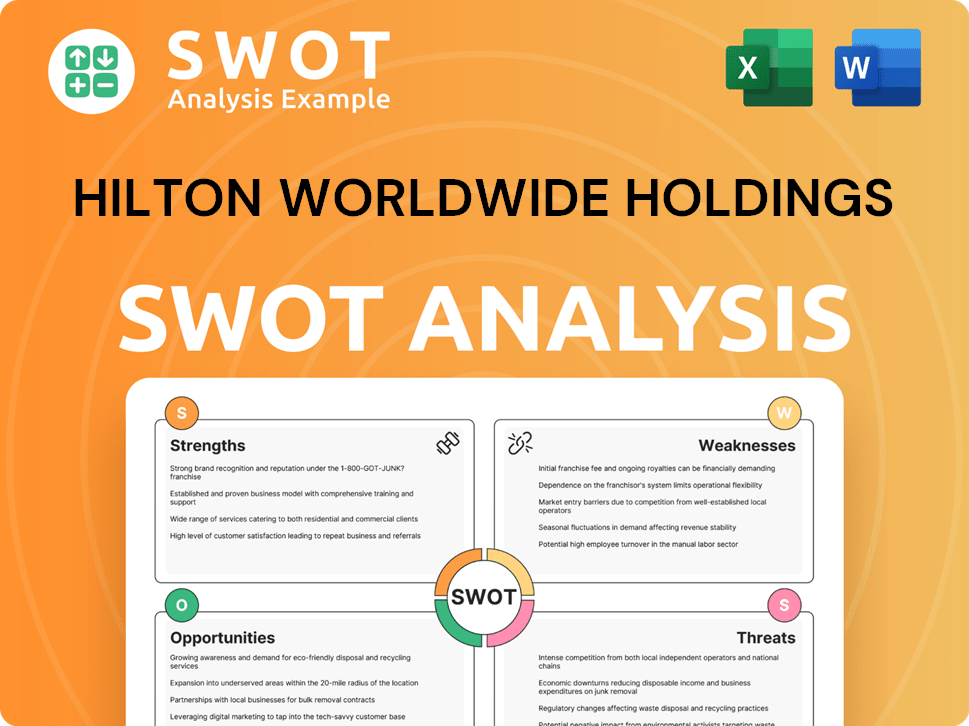
What Marketing Tactics Does Hilton Worldwide Holdings Use?
The marketing tactics employed by Hilton Worldwide Holdings are multifaceted, designed to boost brand recognition, generate leads, and ultimately drive sales. These strategies heavily leverage digital channels, reflecting the evolving landscape of consumer behavior and media consumption. A key focus is on creating engaging content and utilizing data-driven insights to personalize the guest experience.
Hilton's approach integrates both digital and traditional marketing methods, ensuring a broad reach across various demographics and travel preferences. The company consistently refines its strategies, incorporating innovative technologies like AI and virtual reality to enhance customer engagement and improve the booking process. This comprehensive approach is essential for maintaining a competitive edge in the dynamic hospitality market.
To understand the complete picture, it's also crucial to examine the Growth Strategy of Hilton Worldwide Holdings, which provides further context on how these marketing tactics support the company's overall expansion goals.
Hilton.com and its brand websites offer rich content, including destination guides and travel inspiration, to engage potential guests. This strategy helps attract visitors and improves search engine rankings. The focus is on providing valuable information that aligns with customer interests and travel planning needs.
SEO is crucial for ensuring high visibility in search results for travel-related queries. Effective SEO strategies drive organic traffic to Hilton's websites, increasing the chances of bookings. The goal is to capture potential guests actively searching for hotels and travel destinations.
Paid advertising campaigns on search engines and social media target specific demographics and travel intentions. These campaigns allow for precise targeting, ensuring that marketing messages reach the most relevant audiences. This approach maximizes the return on investment in advertising.
Email marketing is a core tactic for nurturing leads, promoting special offers, and engaging Hilton Honors members. Personalized communications enhance customer loyalty and drive repeat bookings. The focus is on delivering relevant and timely information to subscribers.
Hilton collaborates with travel bloggers, content creators, and celebrities to showcase its properties and destinations. These partnerships provide authentic endorsements and expand brand reach. Influencer marketing is a key component of Hilton's social media strategy.
Platforms like Instagram, Facebook, and TikTok are used for brand storytelling, customer engagement, and promotional campaigns. User-generated content is often leveraged to build community and showcase authentic experiences. Social media is a crucial channel for reaching target audiences.
Hilton uses advanced analytics to understand customer behavior, segment audiences, and personalize marketing messages. The company invests in technology for real-time campaign optimization and performance tracking. Innovations include AI for personalized recommendations and dynamic pricing.
- Data Analytics: Hilton uses data to understand customer preferences and tailor marketing efforts.
- Personalization: Marketing messages are personalized to improve engagement and conversion rates.
- AI Integration: Artificial intelligence is employed for personalized recommendations and dynamic pricing.
- VR Experiences: Virtual reality tours enhance the pre-booking experience.
Hilton Worldwide Holdings PESTLE Analysis
- Covers All 6 PESTLE Categories
- No Research Needed – Save Hours of Work
- Built by Experts, Trusted by Consultants
- Instant Download, Ready to Use
- 100% Editable, Fully Customizable
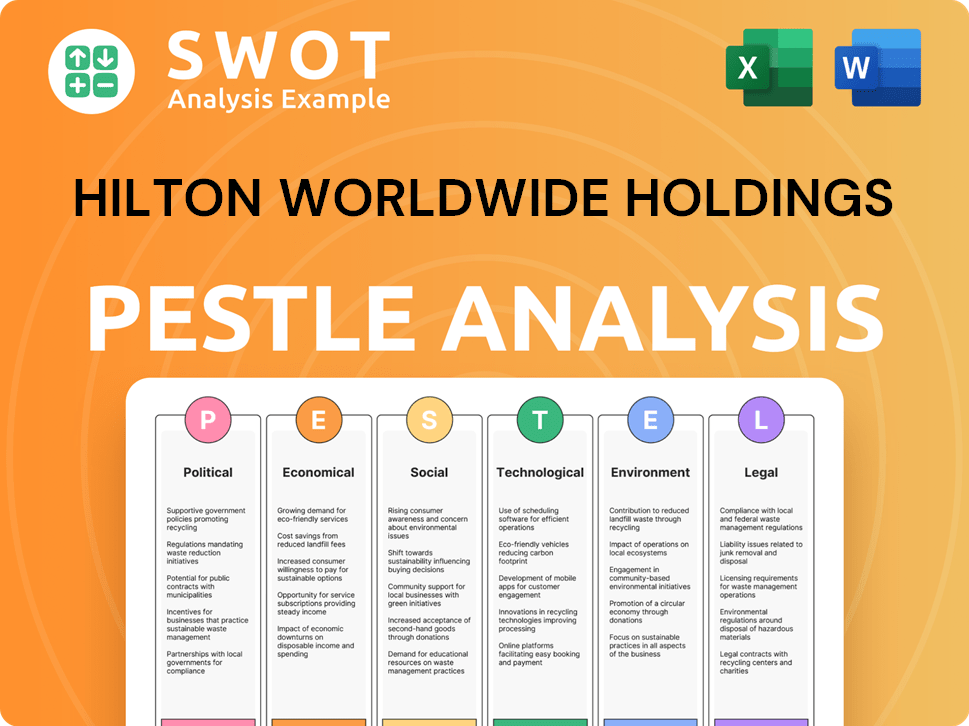
How Is Hilton Worldwide Holdings Positioned in the Market?
Hilton Worldwide Holdings strategically positions its brand to stand out in the competitive hospitality market. The core of its brand identity revolves around delivering consistent quality, exceptional service, and a diverse portfolio of hotel brands, catering to various travel needs. This approach ensures that whether guests choose a luxury stay at a Waldorf Astoria or a more budget-friendly option, they experience the same level of reliability and comfort.
The company's brand positioning is built on the promise of memorable experiences, emphasizing comfort and convenience across its extensive network of hotels. Hilton's brand architecture includes over 22 distinct brands, each tailored to specific target audiences. This allows Hilton to offer a wide range of choices, from high-end luxury to mid-scale options, ensuring it can meet the diverse needs of travelers globally.
Hilton's commitment to innovation and sustainability further enhances its brand appeal. The company's 'Travel with Purpose' strategy and the Hilton Honors loyalty program are central to its brand positioning, fostering strong customer relationships and rewarding loyalty. This focus on ESG initiatives and customer engagement helps Hilton maintain a strong brand image and resonate with a broad audience.
Hilton promises consistently positive 'stays' by emphasizing comfort, convenience, and memorable experiences. This commitment is delivered across its diverse range of brands, ensuring a unified experience for guests. The focus is on providing reliable quality and exceptional service, regardless of the brand or location.
Hilton targets a broad audience by offering a variety of brands, each tailored to specific segments. For example, Waldorf Astoria caters to luxury travelers, while Hampton by Hilton focuses on value-conscious guests. This strategy allows Hilton to capture a wide market share and maintain brand relevance.
The Hilton Honors program is a cornerstone of Hilton's brand positioning, fostering customer loyalty through exclusive benefits and personalized offers. This program encourages repeat business and strengthens customer relationships. As of 2024, Hilton Honors had over 180 million members worldwide.
Hilton's 'Travel with Purpose' strategy highlights its commitment to environmental, social, and governance (ESG) initiatives. This focus on sustainability resonates with environmentally conscious travelers, enhancing brand appeal. Hilton aims to cut its environmental footprint in half by 2030.
Hilton's brand positioning strategy combines luxury, value, innovation, and sustainability to attract a broad customer base. This approach is supported by a strong loyalty program and a commitment to ESG initiatives, ensuring a consistent brand message across all touchpoints.
- Diverse Brand Portfolio: Catering to various market segments from luxury to budget.
- Hilton Honors: Rewarding customer loyalty with exclusive benefits.
- Sustainability: Focusing on environmental and social responsibility.
- Consistent Quality: Ensuring reliable service and memorable experiences.
- Innovation: Continuous improvement in guest technology and services.
Hilton Worldwide Holdings Business Model Canvas
- Complete 9-Block Business Model Canvas
- Effortlessly Communicate Your Business Strategy
- Investor-Ready BMC Format
- 100% Editable and Customizable
- Clear and Structured Layout
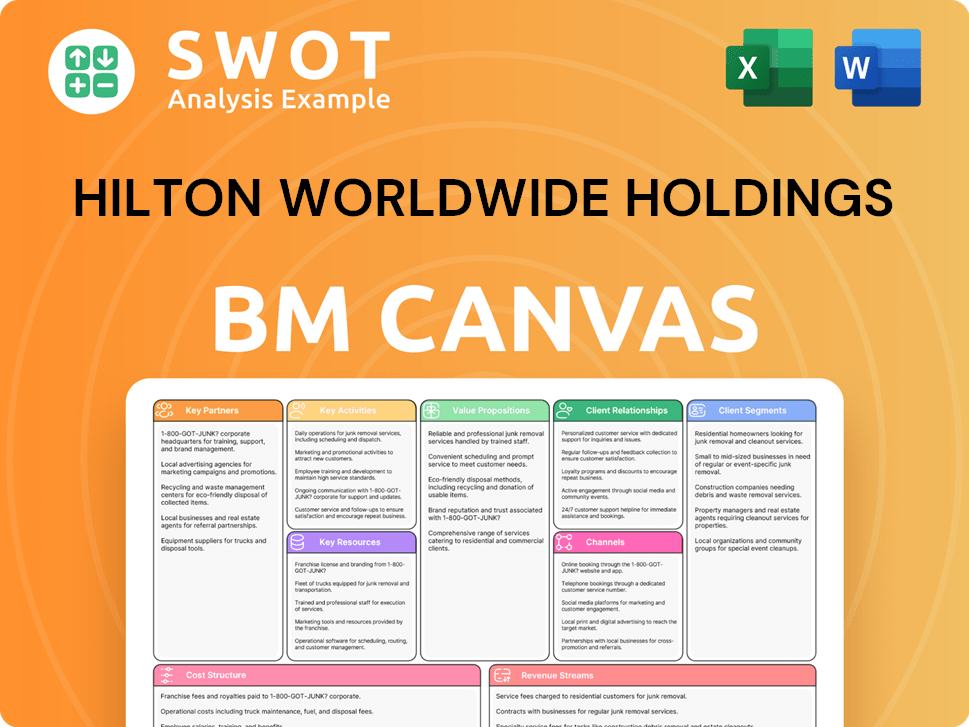
What Are Hilton Worldwide Holdings’s Most Notable Campaigns?
The success of Hilton Worldwide Holdings' marketing and sales strategies hinges on impactful campaigns designed to boost brand engagement and drive revenue. These initiatives are carefully crafted to resonate with diverse customer segments, leveraging both traditional and digital channels. By focusing on customer experience and strategic partnerships, Hilton aims to strengthen its market position and foster long-term customer loyalty.
One of the primary focuses of Hilton's marketing efforts is to enhance the value proposition of the stay itself. This is achieved through campaigns that highlight the unique experiences offered at Hilton hotels, emphasizing comfort, service, and personalized interactions. Furthermore, Hilton consistently invests in its loyalty program, Hilton Honors, to encourage repeat business and foster customer lifetime value.
These strategies are critical for Hilton's overall revenue management and sales performance. By combining compelling advertising with robust loyalty programs and strategic alliances, Hilton creates a powerful marketing ecosystem. This approach not only attracts new customers but also cultivates a loyal customer base, contributing to the company's sustained growth in the competitive hospitality market.
Launched in 2022, the 'For the Stay' campaign aimed to differentiate Hilton by emphasizing the transformative power of the hotel experience. The campaign focused on authentic moments during a stay, highlighting comfort, service, and personalized experiences. It utilized global television spots, digital advertising, and in-hotel activations to drive direct bookings and reinforce the value of choosing Hilton.
The Hilton Honors loyalty program is a cornerstone of Hilton's strategy, driving repeat business and customer lifetime value. Ongoing marketing efforts focus on increasing membership, encouraging direct bookings, and enhancing member engagement. These efforts are promoted across digital channels, email marketing, and in-hotel messaging. As of Q1 2024, the program had over 180 million members.
Hilton engages in strategic partnerships to enhance guest experiences and attract specific traveler segments. A notable example is the collaboration with Peloton, which provides health-conscious travelers with in-room fitness options. These partnerships are often promoted through co-branded digital campaigns and social media activations. These partnerships boost brand visibility and add perceived value for guests.
Hilton's digital marketing strategies include targeted advertising across social media and online platforms. The company uses data analytics to personalize offers and enhance the guest experience. Email marketing campaigns and content marketing examples are used to drive engagement and conversions.
Hilton's sales performance analysis and brand positioning strategy are closely monitored through key performance indicators (KPIs). These include metrics such as occupancy rates, average daily rate (ADR), and revenue per available room (RevPAR). Hilton also tracks customer satisfaction scores and brand engagement metrics to assess the effectiveness of its marketing campaigns.
- Occupancy Rates: Hilton's occupancy rates are a critical indicator of its hotel sales success.
- Average Daily Rate (ADR): ADR reflects the average price paid for occupied rooms, indicating pricing strategy effectiveness.
- Revenue Per Available Room (RevPAR): RevPAR combines occupancy and ADR to measure overall revenue performance.
- Customer Satisfaction Scores: These scores provide insights into guest experiences and the impact of marketing efforts.
Hilton Worldwide Holdings Porter's Five Forces Analysis
- Covers All 5 Competitive Forces in Detail
- Structured for Consultants, Students, and Founders
- 100% Editable in Microsoft Word & Excel
- Instant Digital Download – Use Immediately
- Compatible with Mac & PC – Fully Unlocked
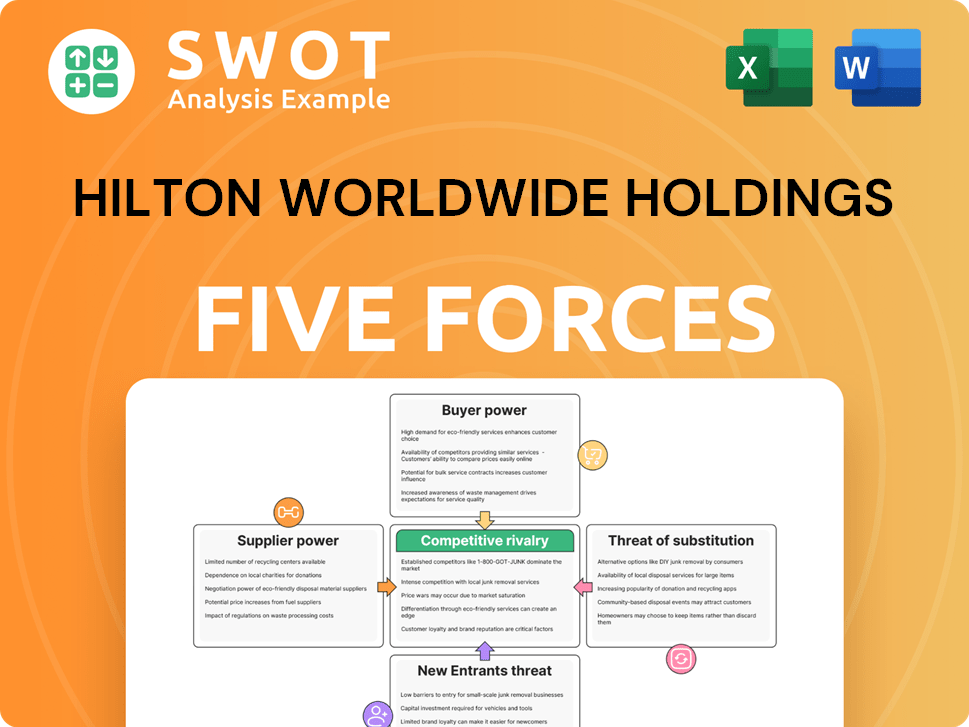
Related Blogs
- What are Mission Vision & Core Values of Hilton Worldwide Holdings Company?
- What is Competitive Landscape of Hilton Worldwide Holdings Company?
- What is Growth Strategy and Future Prospects of Hilton Worldwide Holdings Company?
- How Does Hilton Worldwide Holdings Company Work?
- What is Brief History of Hilton Worldwide Holdings Company?
- Who Owns Hilton Worldwide Holdings Company?
- What is Customer Demographics and Target Market of Hilton Worldwide Holdings Company?
Disclaimer
All information, articles, and product details provided on this website are for general informational and educational purposes only. We do not claim any ownership over, nor do we intend to infringe upon, any trademarks, copyrights, logos, brand names, or other intellectual property mentioned or depicted on this site. Such intellectual property remains the property of its respective owners, and any references here are made solely for identification or informational purposes, without implying any affiliation, endorsement, or partnership.
We make no representations or warranties, express or implied, regarding the accuracy, completeness, or suitability of any content or products presented. Nothing on this website should be construed as legal, tax, investment, financial, medical, or other professional advice. In addition, no part of this site—including articles or product references—constitutes a solicitation, recommendation, endorsement, advertisement, or offer to buy or sell any securities, franchises, or other financial instruments, particularly in jurisdictions where such activity would be unlawful.
All content is of a general nature and may not address the specific circumstances of any individual or entity. It is not a substitute for professional advice or services. Any actions you take based on the information provided here are strictly at your own risk. You accept full responsibility for any decisions or outcomes arising from your use of this website and agree to release us from any liability in connection with your use of, or reliance upon, the content or products found herein.